 | Vukovar is reviving from ashes. Many of its wounds have been cured, but a lots remains to be done in the future. Of course, its extremely difficult past will not be forgotten. One of the symbols of the city is Siniša Glavašević (1960-1991), Croatian writer and newspaperman. |
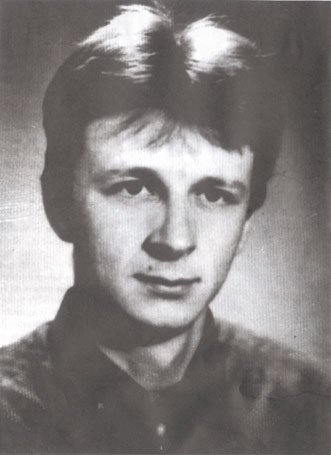
Priča o gradu Odustajem od svih traženja pravde, istine, odustajem od pokušaja da ideale podredim vlastitom životu, odustajem od svega što sam još jučer smatrao nužnim za nekakav dobar početak, ili dobar kraj. Vjerojatno bih odustao i od sebe sama, ali ne mogu. Jer, tko će ostati ako se svi odreknemo sebe i pobjegnemo u svoj strah? Kome ostaviti grad? Tko će mi ga čuvati dok mene ne bude, dok se budem tražio po smetlištima ljudskih duša, dok budem onako sam bez sebe glavinjao, ranjiv i umoran, u vrućici, dok moje oči budu rasle pred osobnim porazom? Tko će čuvati moj grad, moje prijatelje, tko ce Vukovar iznijeti iz mraka? Nema leđa jačih od mojih i vaših, i zato, ako vam nije teško, ako je u vama ostalo još mladenačkog šaputanja, pridružite se. Netko je dirao moje parkove, klupe na kojima su još urezana vaša imena, sjenu u kojoj ste istodobno i dali, i primili prvi poljubac - netko je jednostavno sve ukrao jer, kako objasniti da ni Sjene nema? Nema izloga u kojem ste se divili vlastitim radostima, nema kina u kojem ste gledali najtužniji film, vaša je prošlost jednostavno razorena i sada nemate ništa. Morate iznova graditi. Prvo, svoju prošlost, tražiti svoje korijenje, zatim, svoju sadašnjost, a onda, ako vam ostane snage, uložite je u budućnost. I nemojte biti sami u budućnosti. A grad, za nj ne brinite, on je sve vrijeme bio u vama. Samo skriven. Da ga krvnik ne nađe. Grad - to ste vi. | A Story about the CityI refrain from searching for all justice, truth, I refrain from attempts to let ideals arrange my personal life, I refrain from everything that until yesterday I considered essential for some good beginning or good end. I would possibly refrain from myself, but I cannot. Because who will remain if we renounce ourselves and flee into our fears? Who will inherit the city? Who will watch it for me, when I am gone, while I am searching in the trash heaps of the human spirit, while I am alone as it is staggering without myself, wounded, tired, feverish, while my eyes begin to wax before my personal defeat? Who will watch my city, my friends, who will carry Vukovar from the dark? There aren't shoulders stronger than mine or yours, and therefore if it isn't too much for you, if there still remains in you a youthful whisper, join us. Somebody has touched my parks, the benches that still have your names carved into them, that shadow that you gave it at the same moment, and received your first kiss - somebody has simply stolen it all, because how do you explain that not even a shadow remains? There isn't that store window in which you admired your personal joys, there isn't that movie theater in which you saw the saddest film, your past has been simply decimated and you have nothing. You must build anew. First your roots, your past, and then your present, and then if you still have the strength, invest in the future. Do not be alone in the future. Do not worry about the city, it has been with you all this time. Only hidden. So that the murderer cannot find it. The city - it is you. |
The above text is probably the most famous essay by Siniša Glavašević. Translated from Croatian courtesy Marko Puljić, Saint Louis, USA.
| The aim of this short web page is to describe via photos the life of the city of Vukovar today. The page is accompanied with texts of unforgettable Croatian newspaperman Siniša Glavašević (1961-1991), killed by Serbian forces together with more than 260 wounded from the Vukovar Hospital in 1991. Siniša Glavašević is a receipient of the prestigeous international award Premio Brajnović from the University Pamplon, Spain, in 2001 (posthumously). |
| Reporter: Siniša Glavašević Vukovar, Oct. 1991 Due to all these hard and for many deadly 65 days, political and military activities are continuing. Marking the day of volunteer blood donors some 72 bottles of this liquid had been gathered in Borovo Naselje, blood being in high demand. The destroyed, burned, but not overrun Vukovar has once again managed to brave the shells that numbered 1,000. Sadly, this resulted in another 28 badly wounded and 3 deaths. Apart from the city being shells it had planes flying over it the whole day, probably scouting and taping what still needed to be destroyed. The Petrova Gora and Negoslavci settlements and the barracks did not let the residents of this city to live a regular day. Similar things were happening from Trpinja, Pacetin all the way to Brsadin. However, the Croatian defence units surprised the enemy. The disarray among the enemy that has been recorded for some time now has continued, while the Vukovar police have among prisoners several officers. It is still not clear whether there will be an exchange of prisoners, but according to earlier attempts, the chances for this are next to zero. Another day has passed in waiting and defending, however, everyone is hoping for an upcoming offensive. A second press conference was held today at the International press centre in Osijek. The commander of the Croatian armed forces for Vukovar and the government representative have been speaking about the situation on the front and about political activities. Everyone wishes for the truth about the plight and events on the battlefield in this part of Croatia be sent as far into the world as possible, especially since the Vukovar defence forces are forced to snatch enemy arms and ammunition, as those in charge who are out of encirclement are lacking conscience. However, the situation with food and medicines is somewhat different. Being aware of this, the defence of this city will after Vukovar is freed, and this especially goes for Mitnica that is led by Djo, help liberated the Vinkovci and Osijek municipalities. The enemy does not stand a chance. Source |
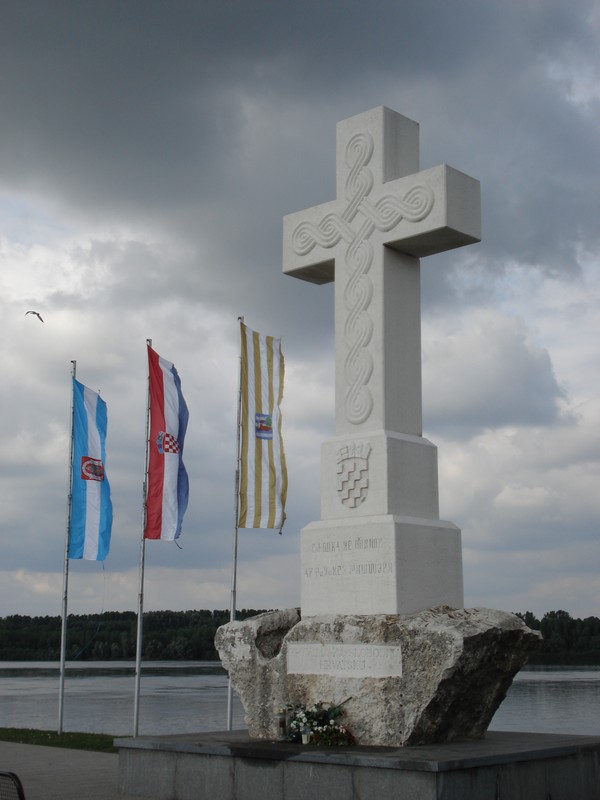
with inscription "Forever lives who dies honorably", carved in the Glagolitic script.
| CROATIAN RADIO VUKOVAR Reporter: Siniša Glavašević Vukovar, Oct. 1991 Due to all these hard and for many deadly 65 days, political and military activities are continuing. Marking the day of volunteer blood donors some 72 bottles of this liquid had been gathered in Borovo Naselje, blood being in high demand. The destroyed, burned, but not overrun Vukovar has once again managed to brave the shells that numbered 1,000. Sadly, this resulted in another 28 badly wounded and 3 deaths. Apart from the city being shells it had planes flying over it the whole day, probably scouting and taping what still needed to be destroyed. The Petrova Gora and Negoslavci settlements and the barracks did not let the residents of this city to live a regular day. Similar things were happening from Trpinja, Pacetin all the way to Brsadin. However, the Croatian defence units surprised the enemy. The disarray among the enemy that has been recorded for some time now has continued, while the Vukovar police have among prisoners several officers. It is still not clear whether there will be an exchange of prisoners, but according to earlier attempts, the chances for this are next to zero. Another day has passed in waiting and defending, however, everyone is hoping for an upcoming offensive. A second press conference was held today at the International press centre in Osijek. The commander of the Croatian armed forces for Vukovar and the government representative have been speaking about the situation on the front and about political activities. Everyone wishes for the truth about the plight and events on the battlefield in this part of Croatia be sent as far into the world as possible, especially since the Vukovar defence forces are forced to snatch enemy arms and ammunition, as those in charge who are out of encirclement are lacking conscience. However, the situation with food and medicines is somewhat different. Being aware of this, the defence of this city will after Vukovar is freed, and this especially goes for Mitnica that is led by Djo, help liberated the Vinkovci and Osijek municipalities. The enemy does not stand a chance. Source |
| CROATIAN RADIO VUKOVAR Reporter: Siniša Glavašević Vukovar, Oct. 1991 The destroyed Vukovar that has nothing else left, but the bare wish to save itself and Croatia from fall, has once again been the target of heavy weaponry that hurled shells at it full blast. However, the defence units were responding by shelling Negoslavci, Trpinja and Djergaj. According to some reports, these points are totally run down and don't have many residents. They have basically become military strongholds. Bogdanovci residents have had a chance of thinking about surrendering to Marinci military forces. Of course, they refused such an offer and continued their defence until the final liberation of Croatia. The attacks from Negoslavci and Petrova gora towards Mitnica and Vucedol all the way to Borovo, Djergaj, Trpinja and Backa continued from the morning hours. Once again the hospital was hit that had 209 wounded and 22 freshly wounded patients, although there were many other targets that could have been chosen. This just goes to prove what the Croatia defence forces are facing daily. Source |
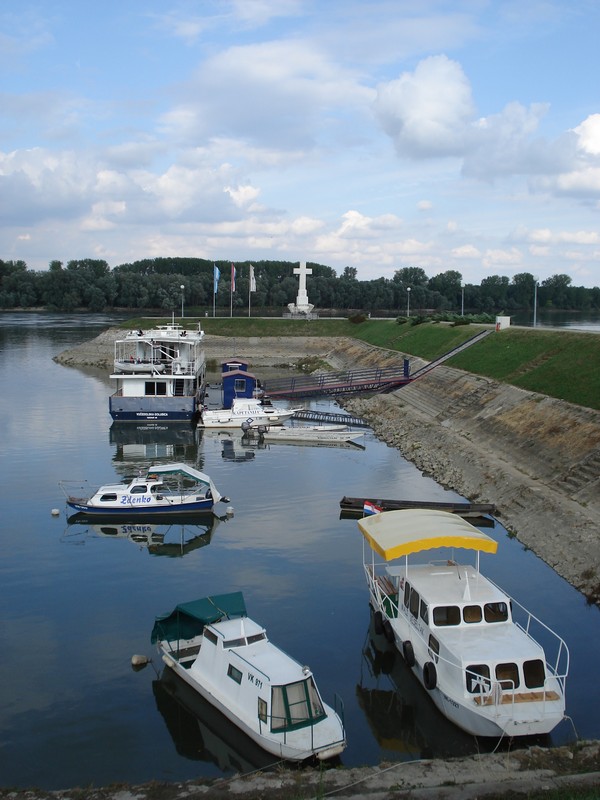
| CROATIAN RADIO VUKOVAR Reporter: Siniša Glavašević Vukovar, Oct. 1991 The first shells hit after 8 o'clock and some 800 have fallen on the city so far today. This was a relatively peaceful day in Vukovar terms, although the enemy struck from all of their positions. Even a plane was dropping bombs on Mitnica between 14:00 and 15:00. However, the fact that some 60 tanks make-up the encirclement at this time, one third of them not working properly, just adds to the fact that the forces of the Greater Serbian army were close to exhaustion. The civilians are having more problems as the cold sets in, but they are awaiting with great hope the news of concrete results of the breaking up the encirclement. They are also made happy by the news of victories, like the one in Negoslavci, where heavy artillery had destroyed a howitzer unit that had been causing great material damage to Vukovar. It also should be mentioned that three enemy tanks had been damaged that had been firing at Vukovar yesterday. So it is quite possible to believe the picture portrayed by the commander for the Croatian armed forces for Vukovar that every possibility of Vukovar falling had been removed. The defence has to speak until that time. Source |
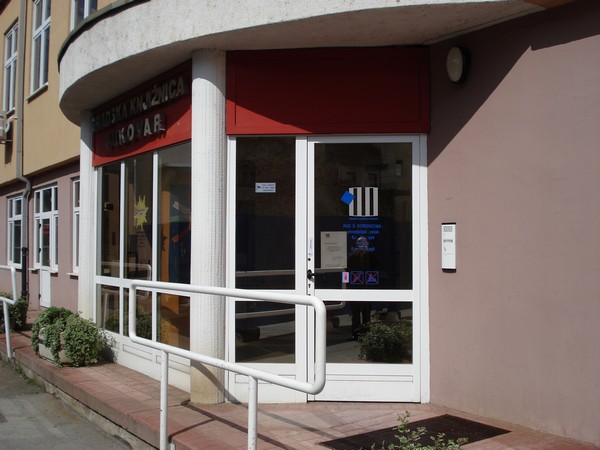
The City Library in Vukovar is a very nice place to visit. It is superbly organized, with a lots workshops, and a pleasant place for reading.
| CROATIAN RADIO VUKOVAR Reporter: Siniša Glavašević Vukovar, Oct. 1991 The new victims in Vukovar should shock both the private and official general public of the world and an answer must hurriedly be found in a bid to stop the killing of children. A 12-year-old and a 13-year-old boy were the victims of enemy shells around 16:00 today and another seven sustained serious injuries. But that is not all - a total of 30 injured with serious injuries sustained from shrapnel will have to be nursed back to health for a long time. Such crimes ask for a response and call for immediate concrete measures by Europe and the world. All those who can hear and who can do something and have not done enough for the city should hear this appeal to their conscience. The good news is that after two weeks a baby had come into the world here - a girl. Sadly, Vukovar has been through more torment today, planes were once again bombing the city and its surrounding areas. Two MIG 21s flew three sorties and caused vast material damage dropping shells of several hundreds of kilograms. The ruins and dust have been further bombed by a Gazela helicopter that hit the Catholic Church dating from the start of the 18th century. But there is not much more to destroy in Vukovar. The air attack that began at midday exactly and lasted around half an hour had had the signature of Mr. Raseta erased from the last peace agreement signed. At the Croatian army command more strong attacks are still believed possible, but after that the powerful JNA will not have anything to take out of Vukovar. This morning the battlefront was active from 8:00 when the first shells started falling. The pressure rose by the hour, but also the resistance of the defence forces. Of course, the shells were coming from Negoslavci, Petrova Gora and Backa. The gravest attacks were carried out in Bogdanovci where the occupying force attacked at 09:00 this morning from Marinci, Petrovci and Brsadin. Bogdanovci were attacked by infantry forces, artillery and tanks. The clash lasted until 15:30 and ended with a victory for the Vukovar and Bogdanovci defence. The military aviation is of today a plane short as it was downed in Mitnica, while the armoured units lost four T-55 tanks on the Bogdanovci battlefield. Another badly hit T-55 tank was left on the Vucedol front. Source |
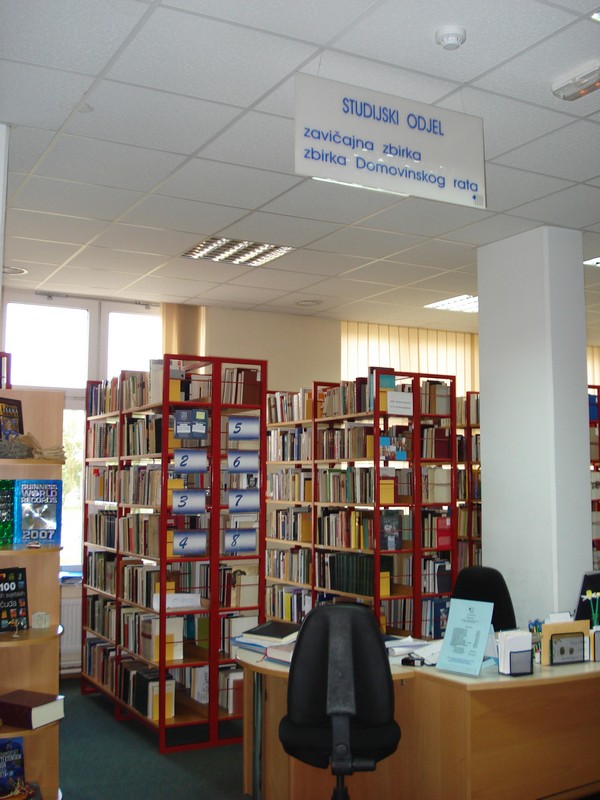
Study room containing Homeland War Collection
| CROATIAN RADIO VUKOVAR Reporter: Siniša Glavašević Vukovar, Oct. 31, 1991 There is still no end to the bestial attacks of drunken Chetniks and reservists plagued by colds. The first report on this came in at dawn. Since 06:00 there has been shelling, with all parts of the city being hit, the attacks coming from Petrova Gora and Negoslavci, while rockets were being fired from Backa. A total of 5,000 shells landed and once again hit the already destroyed ruins and any building that was believed to harbour people. Of course, the hospital was targeted several times. At 06:30 a combined infantry and tank attack began from Petrova Gora. The news that came from the defence positions in Mitnica was that infantry and tanks were moving from Vucedol. In these attacks chemical weapons were used that caused sneezing. Later in the afternoon from Trpinja all the way to the city entry 600 infantrymen were brought in. The Novi Sad command centre must have realised on time that the end of the battles may be near, so it asked for help from nearby airports. After MIG 21s carried out five over flights and shelled the city and rocketed the hospital, all that could be targeted was targeted. Although attacked from three sides on land and from the air, Vukovar managed to destroy by 17:00 some 400 infantrymen, 2 T-55 tanks and damage a few, as well as one MIG 21, so that the JNA aviation now has a total of 10 planes less, as far as Vukovar goes. It was a very cold day today. It was hard for both defenders and civilians to live through the strange October weather. But the enemy has not had it any easier and its forces have been surrendering to the Croatian defence. The fact that Vukovar lives on is supported by efforts for life to be brought back to normal as much as possible. The Croatian Radio Vukovar is also giving its contribution to the effort by introducing Educational programming anchored by enthusiasts and teachers from Vukovar. This effort is aimed at providing some type of entertainment for the children and their parents during the long war hours. Source |
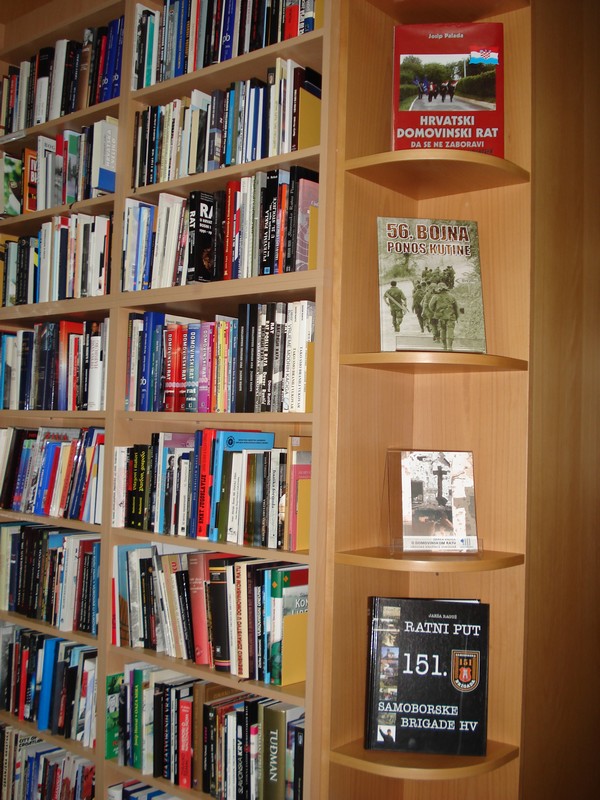
Homeland War Collection has several hundred of different titles related to the Serbian aggression on Croatia in 1991-1995 (the city of Vukovar was under Serbian occupation until 1997).
| Siniša Glavašević PRIČA O ZAGRLJAJU Kad sam bio mali, posve mali, nisam volio da me gospođe, koje su susretali moji roditelji, grle i ljube. Svašta su me ispitivale, ponekad i takve gluposti da sam se čudio njihovoj hrabrosti. Ali sam mislio da je to dio neke igre, ritual koji one moraju proći da bi poslije mogle razgovarati s mojim roditeljima. Meni je to ipak bilo suviše nepristojno, ali sam pristajao na sve. Znao sam čak lijepo pozdraviti. Naučili su me stariji stotinama sitnih pojedinosti koje sam smatrao nevažnima. I onda opet rat. Tek kada smo ostali goli i bosi pred strašnom životnom neumitnošću, kada smo skinuli sa sebe sve prljave navike koje smo navlačili svako jutro pred zrcalom, a zaboravljali ih skidati, kada smo se riješili svega onog što nas čini opasnima, tek tada smo se onako jadni, i opet mali, pod zvijezda zagrlili. I ja sam sada konačno shvatio važnost i bit zagrljaja. Kada nekoga grlite, to je znak da više nemate riječi zahvalnosti što je s vama, to je ono hvala koje vas pokreće da u tom trenutku živite samo za bliskost. A nije bilo tako. Zagrljaji su bili najjeftiniji način da preživite susret do kojeg vam nije stalo. Mislim da će ljudi koji žive ovaj rat još dugo u svojoj svijesti nositi iskon te geste. Tako i treba. Da smo svi to znali, možda svega toga ne bi niti bilo. Kada nekoga grlite, učinite to punim srcem, cijelim bićem, jer ne znate što će vam donijeti sljedeći trenutak. Source |
| Zagreb, 18. studenog 2002. RENE MEDVEŠEK I ČEDO ANTOLIĆ DVA SU DANA PRED PUNOM DVORANOM TEATRA EXIT NASTUPALI U GLAZBENO-POETSKOJ VEČERI GRAD -- VEČER SJEĆANJA NA VUKOVAR Ljubavno pismo Vukovaru Voljeti grad, to znači voljeti njegove ljude. Izreka "Sjeti se smrti" danas se još jasnije u nas može razumjeti ako se izgovori ovako:"Sjeti se Vukovara." "Tko će čuvati moj grad, moje prijatelje, tko će Vukovar iznijeti iz mraka? Nema leđa jačih od mojih i vaših, i zato, ako vam nije teško, ako je u vama ostalo još mladenačkog šaputanja, pridružite se. Netko je dirao moje parkove, klupe na kojima su još urezana vaša imena, sjenu u kojoj ste istodobno i dali, i primili prvi poljubac - netko je jednostavno sve ukrao jer, kako objasniti da ni sjene nema? Nema izloga u kojem ste se divili vlastitim radostima, nema kina u kojem ste gledali najtužniji film, vaša je prošlost jednostavno razorena i sada nemate ništa. Morate iznova graditi. Prvo, svoju prošlost, tražiti svoje korijenje, zatim, svoju sadašnjost, a onda, ako vam ostane snage, uložite je u budućnost. I nemojte biti sami u budućnosti. A grad, za nj ne brinite, on je sve vrijeme bio u vama. Samo skriven. Da ga krvnik ne nađe. Grad - to ste vi." Ovo je dio ljubavnog pisma koje je Siniša Glavašević 16. studenog 1991. godine faksirao Hrvatskom radiju, tadašnjem uredniku Jutarnjeg programa Mladenu Kušecu. Dva ili tri dana poslije dio njegovih zapisa je emitiran, u vrijeme kad je on već bio pokopan na Ovčari. Na samu godišnjicu pada Vukovara, 18. studenog, i dan potom, u Teatru Exit glumac Rene Medvešek kazivao je desetak zapisa iz Glavaševićeve knjige "Priče iz Vukovara" koju su posmrtno objavili Matica hrvatska i Hrvatski radio 1992. godine. Pred prepunom dvoranom oba dana nastupio je i šansonjer Čedo Antolić otpjevavši svoje pjesme većinom posvećene Bogu. Skladno su se suodnosile s Glavaševićevim zapisima u kojima nema mržnje, nema gorčine, nema očaja... Samo obilje ljubavi kojom kupa ljude i svoj grad. |
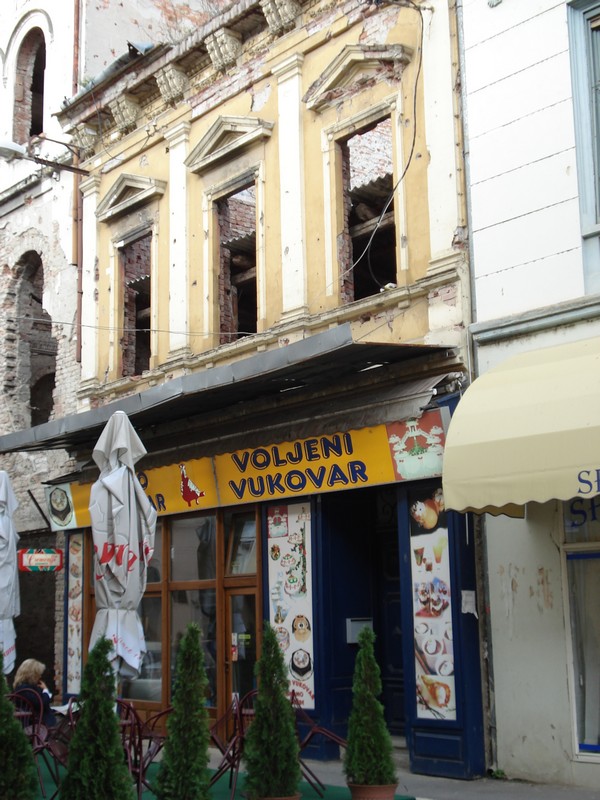
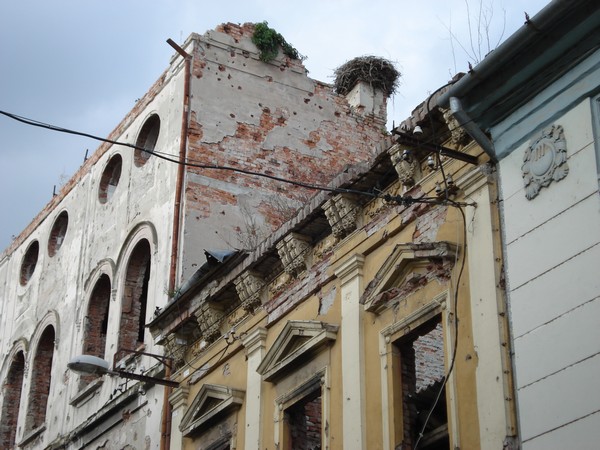
The center of the City of Vukovar, with a stork nest on the chimney (all the photos have been taken in 2007)
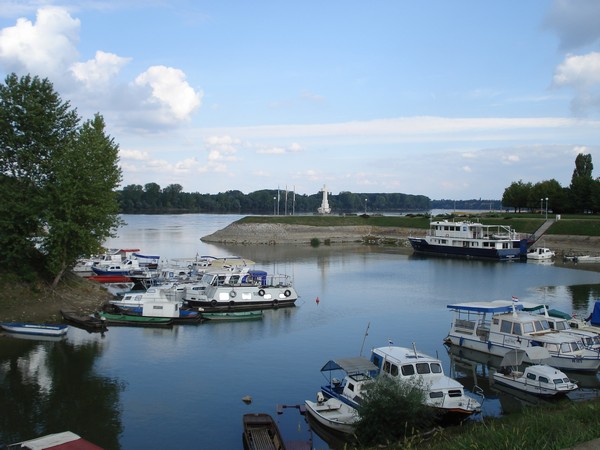
Vukovar has a river port which is recovering, and cargo ships travel for example to Austria and Germany along Danube. There are more and more tourists that arrive to Vukovar.
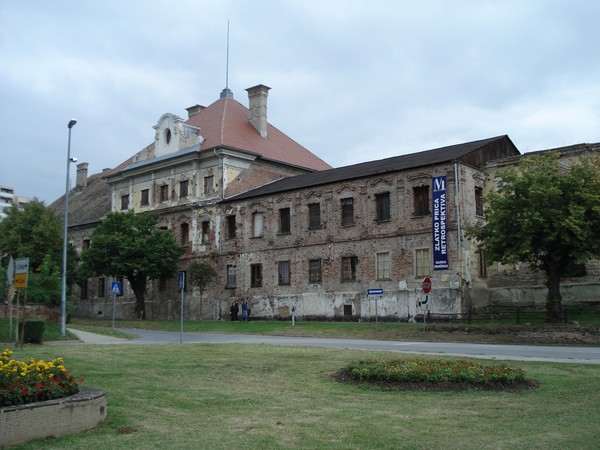
Eltz Palace (The Vukovar Museum)
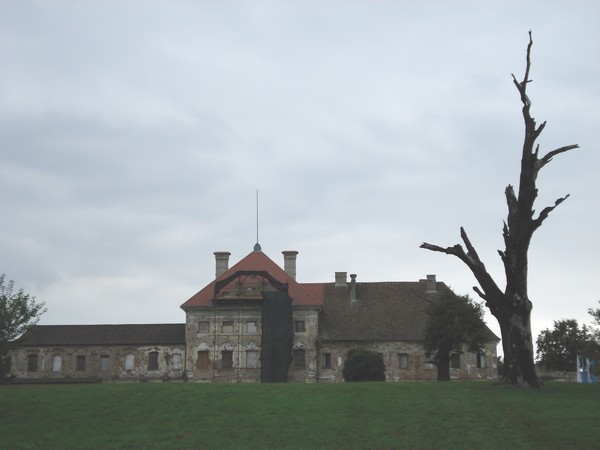
Eltz Palace from the other side, a view from the bank of the Danube river. Note an enormous tree, also a victim of the 1991 aggression on Vukovar.
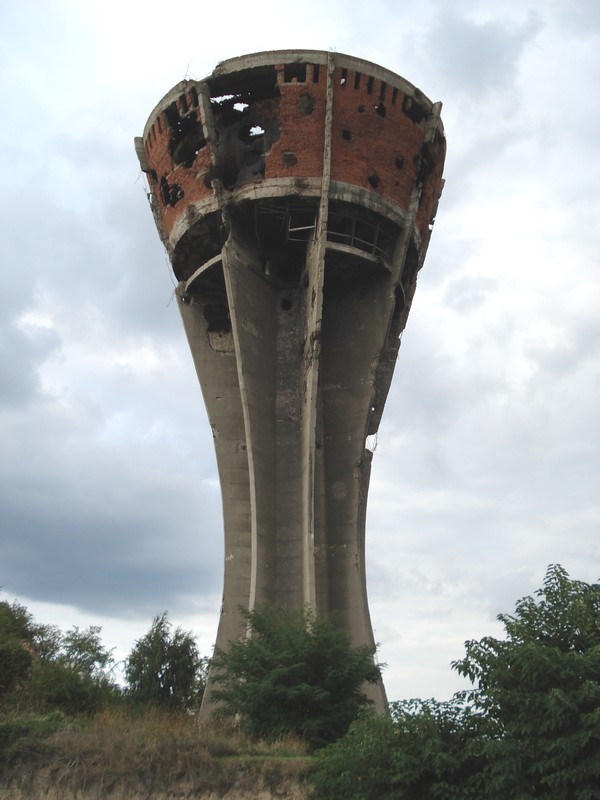
The Water Tower in Vukovar, 50 m high, one of the symbols of Vukovar. It was a favorite target of Serbian forces in 1991. Before the 1991 aggression on Croatia there was also a restaurant on the top.
| Vukovarski Vodotoranj, visok 50 metara, obujma 2200 prostornih metara vode, sagrađen je potkraj šezdesetih godina u tzv. Najpar-vrtu, na ulazu u vukovarsko gradsko naselje Mitnicu i sve do rata pri njegovu se vrhu nalazio restaurant s vidikovcem na Vukovar, Dunav i okolno vučedolsko vinogorje. U skladu s inicijativom pokojnoga hrvatskog predsjednika dr. Franje Tuđmana da svaka hrvatska županija u Vukovaru obnovi po jedan objekt javne namjene, obnovu vukovarskog Vodotornja preuzela je Zadarska županija koja je prije nekoliko godina doznačila tri milijuna kuna. Kad se pokazalo da je obnova i rekonstrukcija Vodotornja poprilično zahtjevan i dugotrajan posao, taj je novac uložen u obnovu drugih objekata javne namjene u Vukovaru, a resorno je ministarstvo obećalo kako će se za obnovu Vodotornja, kad za to dođe vrijeme, potreban novac izdvojiti iz državnog proračuna. U tijeku srpske agresije na Vukovar Vodotoranj je bio jedna od najčešćih meta neprijateljskog topništva koje je nanijelo više od šest stotina oštećenja na toj masivnoj građevini u kojoj i oko koje vukovarske gradske vlasti kane izgraditi Memorijalno područje koje bi svojim uređenjem i namjenom bilo vezano uz Domovinski rat i stradanja Vukovara i Vukovaraca. (Hina) Source |
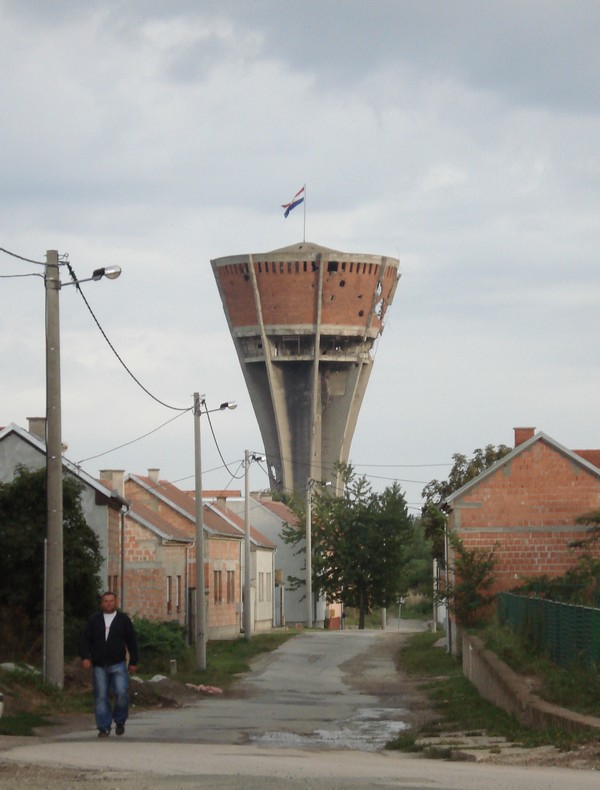
The Water Tower is quite near the Danube river.
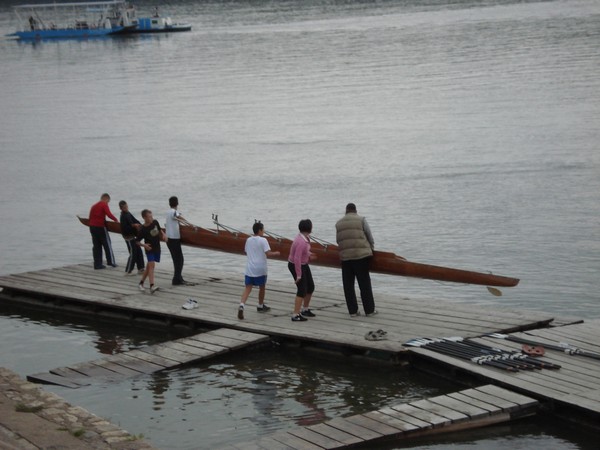
Youngsters - members of the Croatian rowing club Vukovar, enjoing again on the Danube.
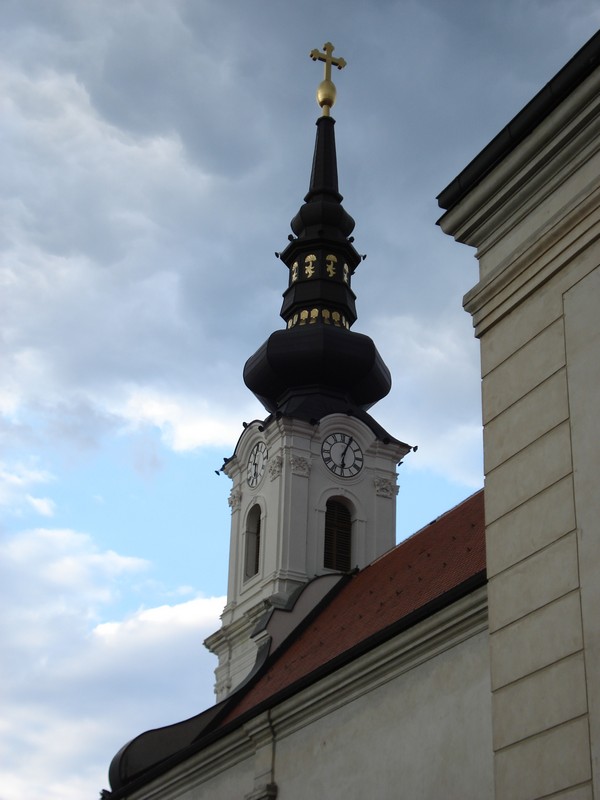
The church of Sv. Kuzma i Damjan, situated on a small hill along Danube, with a bautiful view to the river.
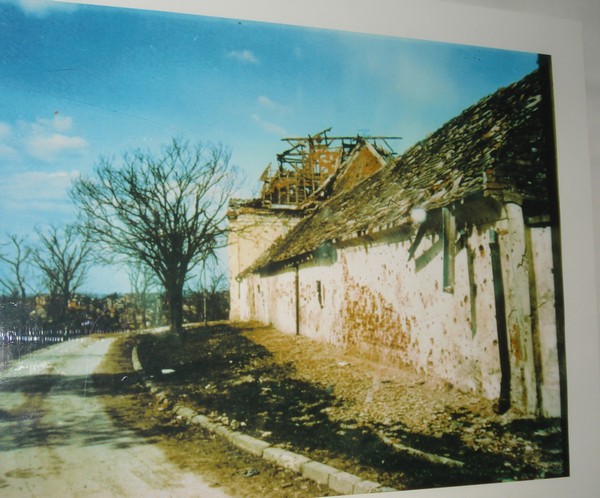
The same church before the reconstruction (and after the 1991 Serbian destruction)
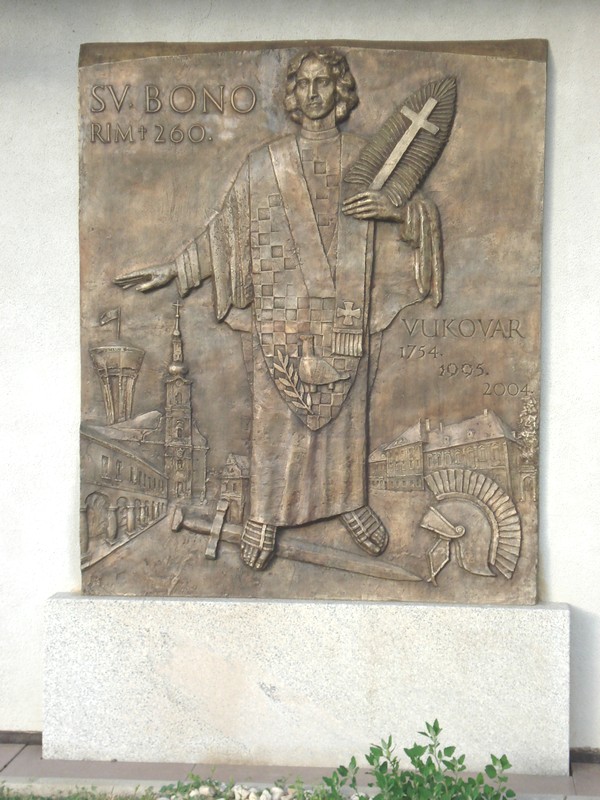
St. Bono, patron saint of the city of Vukovar
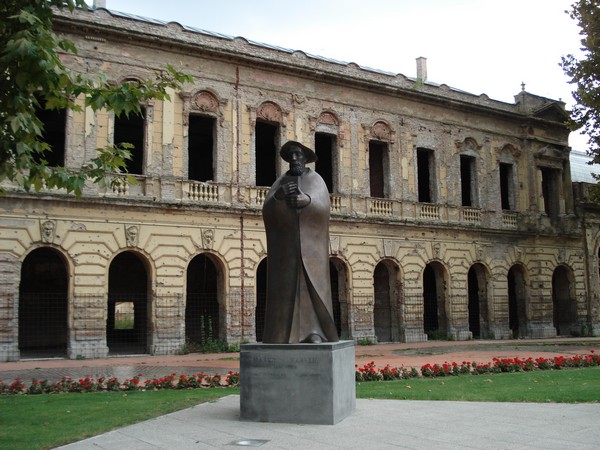
A monument in honour of Marko Marulić of Split. Behind is a building which still shows visible traces of the 1991 Serbian aggression on Croatia.
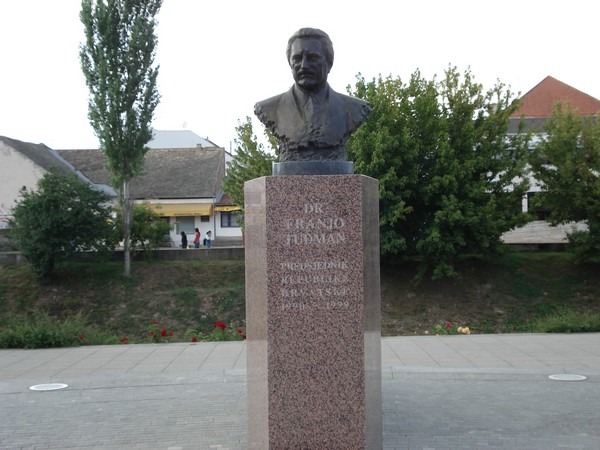
A monument dedicated to Franjo Tuđman, president of the Republic of Croatia from 1990 to 1999.
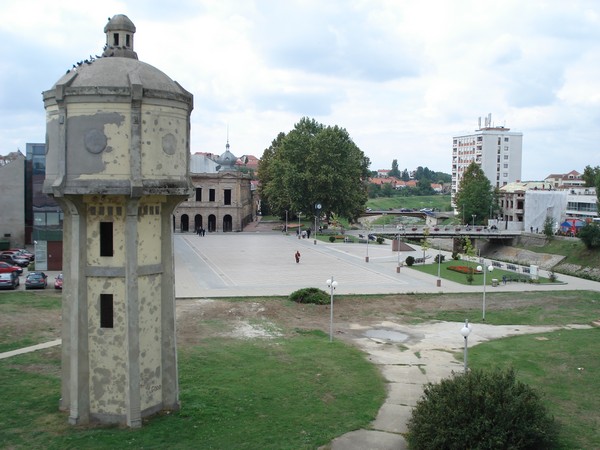
A view from a Vukovar hotel to the central square, and to the river of Vuka on the right, a confluent of Danube.
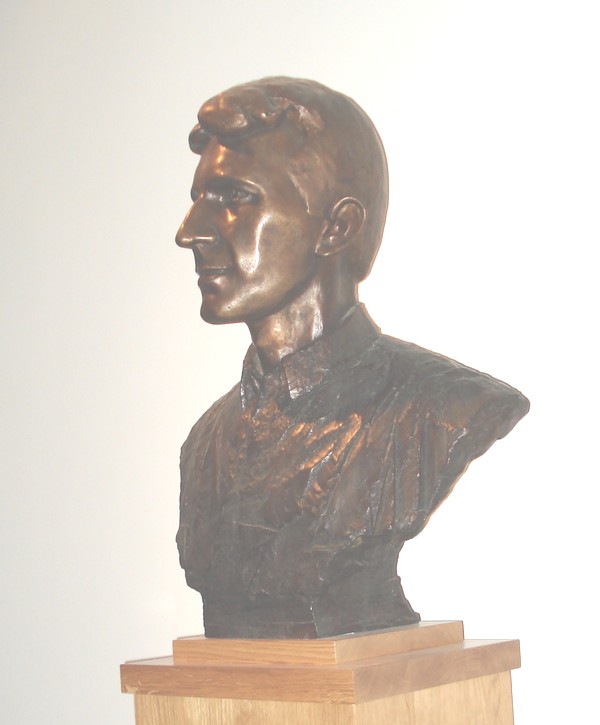
Bust of Siniša Glavašević at Croatian Radio Vukovar
Siniša Glavašević: Pisma iz Vukovara, 1991
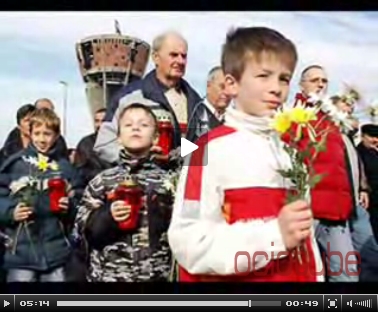
Pisma iz Vukovara - Priča o pjesnicima - Siniša Glavašević
Story about poets video
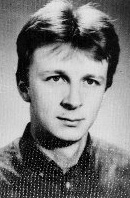
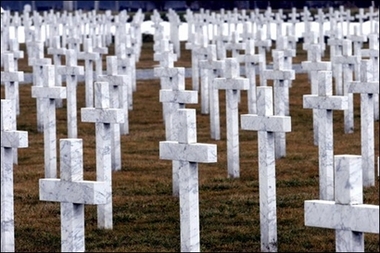
| More than two hundred and sixty Croats have been transported by the Serbs from the Vukovar hospital to the nearby location of Ovčara, killed there and dumped in a massive grave in one day. Below is the list of victims from the Vukovar Hospital. It should be emphasised that this is just a part of Vukovar's victims: there were 1624 victims of the 1991 Serbian aggression (105 of them were soldiers), 2500 wounded (500 of them invalids), and the destiny of 350 is still unknown. About 8000 people went through Serbian concentration camps, maltreated in various ways, by tortures, psychical exhausting, rapes, etc. |
Početkom listopada 1991. na farmi Ovčara, pet kilometara istočno od Vukovara, srpski agresori otvorili su konc logor. Kroz njega je prošlo oko 4000 zatočenika. U ovom logoru ubijeno je 200 zatočenika, a ostali s ovoga popisa još se vode kao nestali. Many thanks to Mr. Mladen Pavković, Koprivnica, Croatia, for the list. |
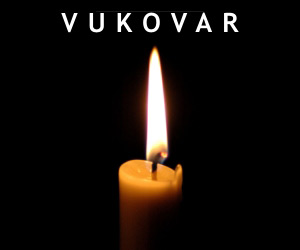
Large sized photos (600 pixles wide) by D.Ž.
Formated for CROWN by prof.dr. Darko Žubrinić
Distributed by www.Croatia.org . This message is intended for Croatian Associations/Institutions and their Friends in Croatia and in the World. The opinions/articles expressed on this list do not reflect personal opinions of the moderator. If the reader of this message is not the intended recipient, please delete or destroy all copies of this communication and please, let us know!